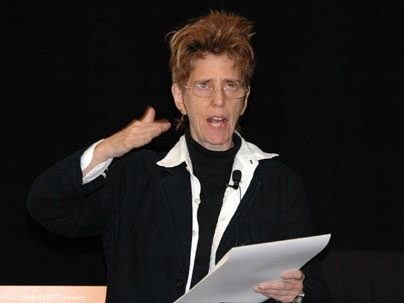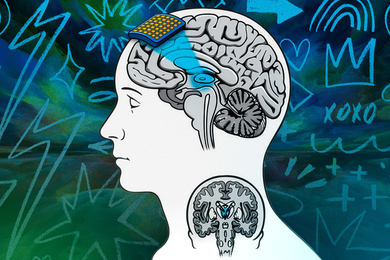Key stakeholders in the American depression epidemic -- neuroscientists, clinicians, patients and health-care industry representatives -- came together Monday at a one-day conference at MIT sponsored by employee benefits company CIGNA and the Picower Institute for Learning and Memory.
Depression, clinically defined as persistent black moods, constant distressing memories and an inability to experience pleasure, affects more than 20 million Americans a year at a huge national cost. "On Depression," which kicked off the Open Mind Series of conferences related to learning and memory, sought to improve the diagnosis, prevention and treatment of depression. The disease is now believed to cause not only mental anguish but also early death from medical conditions as diverse as stroke and cancer.
Moderated by Dr. Peter D. Kramer of Brown University, author of "Listening to Prozac" and "Against Depression," the event's wide-ranging presentations touched on the latest findings in basic neuroscience, insurance issues, behavioral studies, current and potential treatments, depression in the workplace and depression among artists and writers.
Robert Pinsky, former U.S. poet laureate, read poems by Yeats to support his idea that depression is a necessary part of human evolutionary adaptation, a craving for perfection that results in frustration and feelings of worthlessness. Psychiatrists Dr. Charles Nemeroff of Emory University and Dr. Ned H. Kalin of the University of Wisconsin related the results of studies on certain gene combinations that seem to make people resistant or prone to depression. Garry Giannone, vice president at Prudential Financial, used a case study about a divorced single mother whose depression almost cost her her job as an example of how intervention in the workplace is needed to seek out and help undiagnosed and untreated employees.
Panelist Paul H. Stypulkowski of Medtronic Neurological described how a treatment of last resort -- deep brain stimulation, in which electrical leads are implanted in the brain --has successfully treated symptoms of Parkinson's disease and epilepsy and may be applied to depression.
The conference's goal, said co-organizer Mark Bear, Picower Professor of Neuroscience at the Picower Institute, was to allow a diverse group of professionals to explore how fundamental insights in neuroscience can be applied to problems of great societal importance. The Open Mind Series, said Keith Dixon, president of CIGNA Behavioral Health, is a demonstration of CIGNA's "commitment to understanding more about the complex relationship between the mind and body and to learn what else we can do to help people maintain good health and well-being."
The conference's dozen speakers and four panelists described the challenges facing the diagnosis, treatment and fundamental molecular and genetic basis of depression. Writer, composer and musician Elizabeth Swados and Susanna Kaysen, author of "Girl, Interrupted," described their personal experiences with depression. "It never feels like it will pass," Swados said, but when it does, she said she works frenetically to use what she observed about her agony to inform her art. "I transform a hateful monologue in my head -- screams from my heart and my head -- and turn them into melodies," she said. "Depression has taught me to know myself," Kaysen said. "I thank it for that."
The next CIGNA-sponsored conferences in the Open Mind Series at MIT are expected to focus on childhood learning; addiction, considered a powerful form of memory; and learning and memory in an aging population.
A version of this article appeared in MIT Tech Talk on September 21, 2005 (download PDF).







